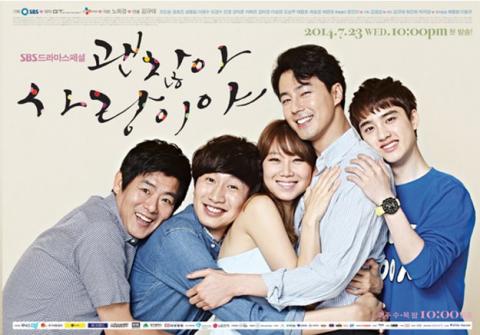New Korean TV Show Tackles Taboo Subject of Mental Illness

From our content partner New America Media:
SAN FRANCISCO – South Korea is notorious for having one of the world’s highest suicide rates. For years now, it has ranked consistently near the bottom in global happiness indices. Yet despite these glaring statistics, few if any South Koreans talk openly about mental health.
That may be changing now, though, thanks to a recent television drama that takes place in the mental health ward of a hospital.
The TV show, titled “It’s OK, That’s Love,” stars Gong Hyo-jin, who plays Ji Hae-soo, a psychiatrist working in a hospital in Seoul. She meets a successful novelist struggling with Obsessive Compulsive Disorder and schizophrenia. What begins as a series of comedic encounters soon transforms into a budding romantic relationship between two individuals coming to grips with their own inner turmoil.
In Korea’s media saturated society, the program is already beginning to lift the veil – if only slightly – on long-held taboos around mental health.
Yoon Hong-gyun, a practicing psychiatrist in Seoul, says he’s seen an uptick in the number of visitors to his office seeking treatment since the show aired this summer on Korean channel SBS. “Many of them want to know whether they suffer from OCD, like the main character in the show,” he explained. Yoon added most of these new patients are young people.
The show’s impact can also be seen in online chat forums such as Naver, where one Seoul resident posted the following anonymous comment: “Before I watched this drama, I thought seeking help for things like depression was bad.” The user goes on to explain that he lost his job because of depression and asks for suggestions of hospitals that offer counseling.
Data from the Korea Centers for Disease Control and Prevention show that some 13 percent of adults in South Korea reported feeling depressed for up to two consecutive weeks in 2012. The number of cases involving depression or other mental-health related conditions spiked 77 percent in the last decade, with more than half of those cases admitting to having thoughts of suicide.
Cultural taboos around mental illness also extend to Koreans living abroad, including in the United States.
Jonathan Kang, a clinical psychologist working with mostly Korean immigrants in Los Angeles’ Koreatown neighborhood, says many Korean Americans tend to delay treatment until well after first noticing signs of distress.
“I’ve met with many patients who have delayed seeking treatment … making effective treatment more complicated. It’s important they come in as soon as they detect warning signs.”
But while Korean TV dramas are also popular within Korean American immigrant communities, whether or not they can actually change their behavior remains a question.
Eunice Kim is a medical interpreter working in San Francisco and an avid consumer of Korean dramas. A Korean immigrant herself, she says these shows might have an impact on younger, more tech-savvy Korean Americans, but less so for older, first generation immigrants who she says tend to be even “more conservative” than their peers in South Korea. That’s because many arrived prior to the explosion of the Internet and tend to be more isolated from public discussions around social issues.
As an example, Kim points to a popular 2010 Korean TV drama that featured as part of the plot a romantic relationship between two men. Kim says that while it sparked conversation in Korea, she saw “little change” in attitudes among first-generation Korean immigrants here.
The show aired 10 years after Korean TV personality Seokcheon Hong came out publicly as gay. Initially met with derision and open hostility, he later landed a spot on a cable series where sex and sexual orientation are openly discussed.

But when it comes to getting treated for mental health, South Koreans have more to worry about than public shame. A New York Times article from 2011 pointed out that those who do seek counseling often pay in cash to avoid any official record appearing when they seek employment.
More troubling, perhaps, are fears of being hospitalized against their will.
In one scene from the TV show, the lead male character is forcibly institutionalized on the urging of his mother, who fears that he is suicidal. Korean law makes involuntary confinement relatively easy, with the approval of one or both parental figures and a clinician’s diagnosis enough. Mental health advocates in the country are now working to change the law.
It's the kind of scene that Yoon says typifies media portrayals of people with mental health issues, reinforcing the notion that such people need to be isolated from mainstream society.
“The way media portray people with mental health problems must change,” he says, adding that often such individuals are depicted as being the butt of jokes. Yoon says such stereotypes “make people want to hide their problems.”
But for Ji-eun Yang, a 22-year-old living in Ulsan, an industrial port city in the country’s southeast, the TV show made the thought of seeking treatment less intimidating when, she says, “my mind is hurt or wounded.”
Yang says the show also made her realize just how common mental health disorders can be, noting that one of the characters – a psychiatrist named Dong-min Cho – seeks help for emotional trauma after a bitter divorce. When his friend, a surgeon, laughingly points out the irony of a psychiatrist needing therapy, Cho replies, “Would it be OK to laugh at you for getting cancer, even if you’re a surgeon?”
The scene, Yang says, “showed me that people facing mental health struggles are not as far from me as I thought.”
Additional reporting by Peter Schurmann.
This story was produced as part of New America Media's ongoing coverage of mental health issues among youth and immigrant communities. For more information click here #FeelBetter
From our content partner New America Media






























































































































































































































































































































